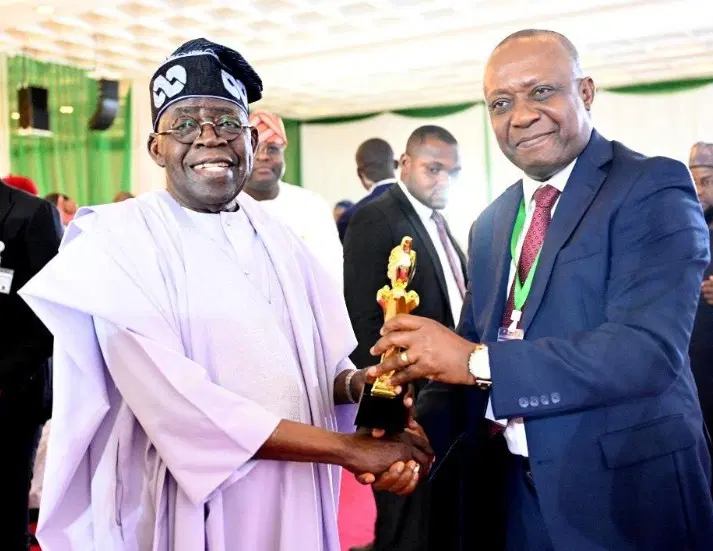In a significant policy signal that could reshape the future of journalism in Nigeria, President Bola Ahmed Tinubu has endorsed the proposal by the Nigeria Guild of Editors (NGE) calling for comprehensive tax relief and Value Added Tax (VAT) exemption for the media sector. The move has been widely welcomed as a potential game-changer for an industry currently battling financial distress and technological disruption.
A President’s Nod to Media Sustainability
During an engagement with members of the NGE in Abuja, President Tinubu expressed his firm support for the Guild’s proposal, acknowledging the mounting economic challenges confronting the media. He noted that the administration values the media’s indispensable role in nurturing democracy, promoting accountability, and strengthening national unity.
Tinubu’s endorsement comes amid growing concerns over the survival of traditional and digital news outlets struggling with rising production costs, declining ad revenues, and shrinking audience trust. By supporting tax incentives, Tinubu signaled a readiness to collaborate with industry stakeholders to ensure the Nigerian media ecosystem remains viable and competitive.
Inside the NGE’s Proposal
The Nigeria Guild of Editors — representing top media professionals across print, broadcast, and digital platforms — submitted a proposal urging the government to implement a 10-year corporate tax relief and VAT exemption on essential media inputs such as newsprint, printing machines, and broadcast equipment.
The key components of the proposal include:
- Corporate Tax Relief: A 10-year holiday to help media organizations reinvest profits in technology, training, and infrastructure.
- VAT Exemption: Removal of VAT on essential production inputs to reduce operational costs.
- Tax Deductions for Advertisers: Incentives for brands and agencies that place advertisements in verified Nigerian media outlets, encouraging local industry growth.
- Access to Concessionary Loans: Provision of low-interest credit through the Bank of Industry (BOI) and other development finance institutions to enable digitization and equipment upgrades.
According to the NGE, these measures are not merely fiscal benefits but essential survival tools for an industry facing existential threats.
Media Industry Under Siege
For decades, Nigeria’s media landscape has been one of the most vibrant in Africa, renowned for its investigative spirit and watchdog role. Yet, the sector has been severely hit by multiple crises:
- Escalating Production Costs: Prices of newsprint, ink, and distribution have soared due to inflation and import dependency.
- Digital Disruption: Online platforms have eroded traditional revenue streams without replacing them with sustainable income models.
- Advertising Decline: Brands increasingly prefer digital giants like Google and Meta, leaving local media struggling for ad revenue.
- Job Cuts and Wage Delays: Several major news organizations have downsized, while many journalists face unpaid or delayed salaries.
The NGE noted that without urgent intervention, many long-standing media houses risk extinction — a scenario that could harm democratic discourse and limit citizens’ access to verified information.
Tinubu’s Charge to the Media
While expressing his support for the tax relief proposal, President Tinubu also used the occasion to urge editors and journalists to uphold the principles of fairness, patriotism, and professionalism in their reporting.
He cautioned that misinformation and sensationalism could undermine national unity, emphasizing that press freedom comes with the responsibility of accuracy and ethical conduct.
“The media must be a stabilizing force for truth and unity, not an amplifier of division,” Tinubu said.
“We may differ in opinions, but our commitment to Nigeria’s progress must remain unshaken.”
The President’s remarks reflect a delicate balance — encouraging fiscal support for the press while reminding journalists of their gatekeeping responsibilities in a democratic society.
Reactions from the Media Community
Media executives and journalism advocates have hailed Tinubu’s endorsement as a historic breakthrough that could reshape media policy in Nigeria.
Mrs. Funke Egbemode, a former president of the NGE, described the development as “a long-overdue recognition of the media’s economic contribution to national development.”
Others, however, cautioned that the proposal must not be politicized or tied to editorial compliance, warning that financial support should never translate into government influence over content.
According to industry observers, the real test will lie in how swiftly and transparently the proposed measures are implemented — and whether they lead to tangible relief for struggling media houses.
Economic Implications of the Proposed Relief
Experts say the introduction of tax relief and VAT exemption could have wide-ranging benefits for the economy and democracy:
- Operational Stability: Reduced taxes mean more liquidity for reinvestment in technology, journalism training, and newsroom innovation.
- Job Preservation: Financially stable media firms can retain and even expand staff, reducing unemployment in the creative sector.
- Boost to Local Manufacturing: Exempting VAT on equipment and newsprint could stimulate local printing and broadcast technology industries.
- Enhanced Press Freedom: By improving financial independence, tax incentives could indirectly strengthen editorial freedom.
- Increased Advertising Activity: Deductions for local advertising could redirect ad spending from foreign tech platforms to domestic outlets.
If implemented effectively, the initiative could become a cornerstone of Nigeria’s new Media Sustainability Framework — one that aligns economic viability with democratic accountability.
The Road Ahead
Although President Tinubu’s endorsement has ignited optimism, stakeholders agree that concrete policy steps must follow.
The proposed tax and VAT exemptions will require legislative backing, possibly through amendments to existing tax codes or through a dedicated Media Support Bill.
Industry leaders have called for a joint government–media task force to oversee implementation, monitor compliance, and ensure transparency in the allocation of financial support.
Analysts also emphasize the need for a digital transition fund, enabling legacy media to modernize operations, adopt data-driven journalism, and compete globally.



